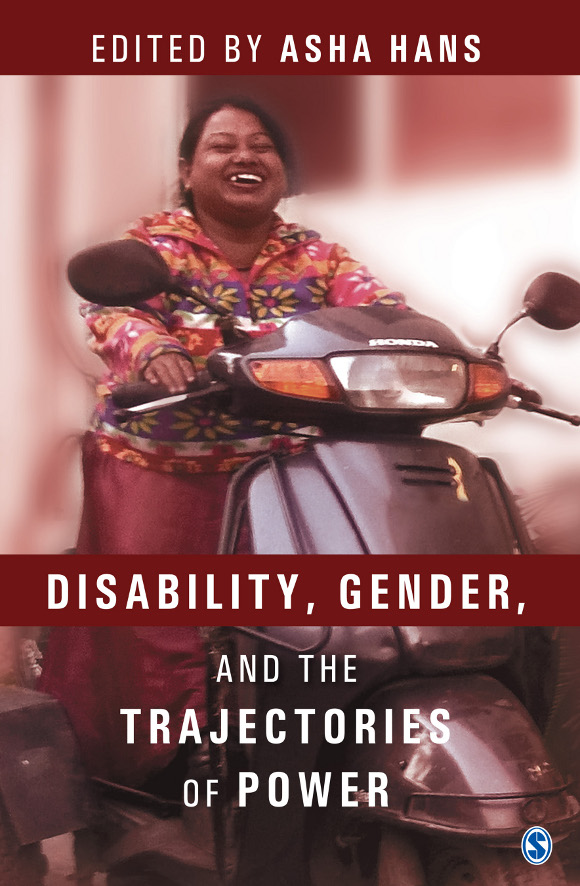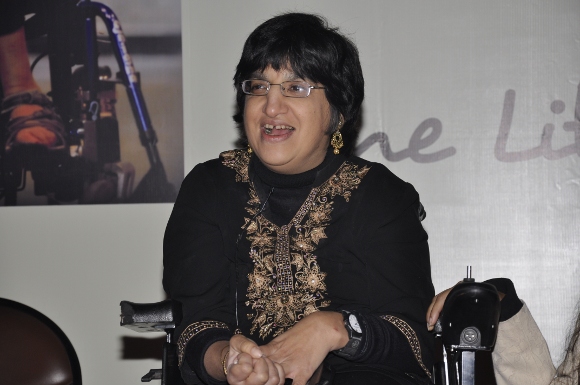December 3 was the International Day of People with Disability. In this excerpt from Disability, Gender and the Trajectories of Power, edited by Asha Hans and published by Sage Publications, Malini Chib, disability rights activist and author, who has cerebral palsy, shares her experiences and observations as she got around to developing a strong disability identity that she wants to “celebrate” rather than reject.

Cover of Disability, Gender and the Trajectories of Power; Edited by Asha Hans. Pic: Sage Publications
I am a disabled, heterosexual, and an Asian upper-middle-class woman. My disability is only one part of my identity, yet sadly, that is the only part that the society decides to see, or even acknowledge. …
Positive attitudes play an important part in formulating a disabled person’s identity. My empowerment and entry into adulthood began for the first time in London, at a conference where for the first time I saw and met adults with disability who could contribute as they were. These adults, I noticed, used communicators, wheelchairs, and helpers. They were articulate and empowered and had their sense of independence about them despite their disability. For the first time, I realized that there was no shame in using any of these.
This is the sense, the feeling of freedom that I got in London that led me to writing in my book One Little Finger:
The electric wheelchair gave me a tremendous feeling of movement and space. With this, I did not feel as if I could not walk. I did not feel helpless. I could slip into shops, chemists, bookshops, restaurants etcetera. Whatever the so called normal person does, I could do. I did this with ease and it did wonders for my self-confidence. I was whizzing round, with mother. With this new freedom I went everywhere. Independent means of movement added a new dimension to my growth and identity. I could go wherever I wanted for the first time in my life. (Chib, 2011)
This was unique as for 29 years I had not experienced any independent freedom of movement on roads anywhere. Thus, in London, to be able to move on one’s own was a luxury. Having got this freedom, it left me with huge number of choices about what I wanted to do. If I wanted to, I could go down to the pub instead of sitting in the library and completing my Master’s. This independence of choice, as I stated earlier, had a tremendous impact on my identity, my empowerment, and my enrichment. …
I feel that a disabled person need not live in denial of their disability. Instead, a disabled person should celebrate her/his difference. This is despite it being unduly challenging to come to terms with ones disability, confronted as we are in society with perfect bodies who seem to have no difficulty in living a normal life. For a disabled person to accept her/his disability enables her/him to reflect on capabilities and limitations and to find a balance between the two.
Disabled people have to find a way to feel comfortable with themselves and their own bodies. And this is despite the general apathy of society that fails to accept anything different from the norm. The temptation to acquire a false identity because it makes one believe that their disability is removed is strong with a disabled person. Yet it needs to be resisted, for only in being true to oneself and one’s abilities and limitations can one truly come alive and contribute the best that they can. This is as true for those without inhibiting disabilities as it is for disabled people. …
While making sense of one’s disability, one must, like Foucault, ask: Who is normal? What we mean by normal is uniformity. However, since no two individuals are the same, how can anyone be truly normal?
Hence, to ascertain a disabled identity is not an easy task in the abled, normal world. It is only when the concept of identity has become both debatable and a new area of research that we will truly be able to acknowledge a disabled identity. Yet it is the self that must enable us to reflect on who we are, whom we choose to identify with, and what we choose to do as matters of choice. …
A person without disability automatically assumes that a disabled person wants to be cured. As if there is a cure for disability. Is there a cure for disability? For the disabled persons who are proud of who they are, for whom their identity as disabled has been an important part of making meaning about themselves and the people and the world they have known, the refusal of cure can be the response to this societal quest of treating disabled people. …
Malini Chib, an author and disability rights activist. Pic: WFS
Reflecting back to my life as I do in One Little Finger, a normal identity was ingrained in me. My conditioning was to become normal or perfect. As I grew older, I realized being normal wasn’t going to happen in this lifetime. This I realized during my Master’s in London. It was at a time when the disability movement in London was beginning.
Disabled people were just starting to fight for their rights. By fighting for their rights, they were discovering their own inner capabilities and potential. Learning about the latest social model of disability and the changing approach to the treatment of disabled people helped me to accept my own challenging situation and my body.

Most people think that disabled people are a liability and a burden. What does a woman of forty do? The normal and ordinary things like traveling. Why am I so special? I can live and contribute in society. People often ask me … “Can you live alone?” “Can you have a relationship?” and basically “Can you manage life as an adult?” I am just another person. I want to be accepted for just being who I am, without too much of questioning and stares about my disability … also a part of me will always long to feel I want to contribute to be a citizen … if I am allowed to. (Chib, 2004)
I am paralyzed on Tottenham Court Road, my wheelchair stuck in a puddle. No one understands my speech and hence can’t help me even though they want to. Finally a cute young man with blue eyes, a square jaw and two dimples, pauses a little longer than the others. He gets down on his knees and tries to understand me. In my panic my words rush out more incoherently. In desperation, I point to my bag hanging behind my wheelchair and say “bag” repeatedly. He understands and as he looks inside and sees my communicator he asks, “You want this gadget with a keyboard?” I repeat a vehement “yes, yes.” He puts it on my lap, I switch it on and I type on it: “my wheelchair is stuck on a puddle, can you help get it out.” He smiles the most enduring smile, examines the wheelchair and the puddle and stops another passerby. Together they push and shove my wheelchair out of the puddle and I can be on my way. But I don’t go. “Can I pay you back for your kindness with a coffee,” I type on the communicator after a “thank you.” He lets out a loud laugh. He’s both intrigued and amused. With the same enduring smile he says, “why not.” I feel like I am the queen of the world.

